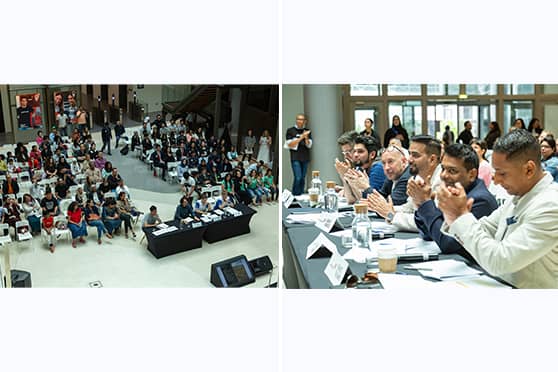Middle East’s student design competition, Project Design Space returns


The Dubai Institute of Design and Innovation (DIDI), the region’s first university dedicated to design and innovation, is delighted to announce that participation in its annual Project Design Space competition is higher than ever this edition. The youth design competition, which is now in its sixth edition and engages students aged 14-18, has seen participation from over 2,500 students this year, a 125% increase since Project Design Space launched in 2017. Schools from across the UAE and wider region (including Saudi Arabia, Kuwait, Jordan and Oman) have enrolled and for the first time the competition has also reached out to India.
Project Design Space was launched in 2017 with the objective of building design skills and future-focused, problem-solving mindsets to prepare the youths of today for the jobs of the future. Presenting innovative and authentic design challenges from a variety of clients, the programme, which is aimed at high school students between 9-12 years, is unique in that it gives participating students the opportunity to solve problems for real life clients. The five clients on board this year include Louvre Abu Dhabi, Mubadala Health, Hunter Foods, Schneider Electric and HP.
Commenting on Project Design Space, DIDI’s president Mohammad Abdullah, said, “In our capacity as the Middle East’s first and only university exclusively dedicated to design and innovation, DIDI is future-proofing the next generation of designers, arming them with the skills of the future. Since launching in 2017, Project Design Space has created unrivalled opportunities for creative thinkers to conceptualise, problem solve and turn ideas into impact. It is wonderful to see such considerable engagement in the competition this year – the highest to date – and we look forward to supporting our clients with innovative solutions to potentially contribute to their growth in the UAE and beyond. DIDI is proud to be rewriting the rules on how design is taught worldwide.”
Run digitally again this year, the Project Design Space competition spans a period of six-months, with the DIDI faculty sourcing client briefs, enrolling schools and running workshops for teachers and students across multiple disciplines covering design thinking skills, applied problem solving, prototyping, teamwork and pitching. Having expanded the programme’s reach to the GCC, Levant and the United States in previous years, Project Design Space has, for the very first time this edition, brought its interdisciplinary curriculum to students in India. The design briefs this year include:
Commenting on their design brief and the collaboration with DIDI, Hunter Foods’ managing director Ananya Narayan, said, “What we do has to connect with today’s and tomorrow’s youth. They are the present and they are the future. We would love to learn from them, to see the world from their angle and perspectives, and how they like to see and taste their favourite snacks. In the UAE, we have more than 200 nationalities. It is a perfect place for our kids and local businesses to be ambitious and to go global, across geo borders.”
Participating students and teams this year are due to submit their creative design solutions to DIDI, in video format, in the coming weeks. The shortlist for each design brief will then be announced at the end of March 2022 and DIDI will shortlist the top eight submissions for each design challenge. Shortlisted teams will then be invited to attend bootcamp sessions to gain feedback on how to enhance their ideas. Final presentations will then take place between May and June.